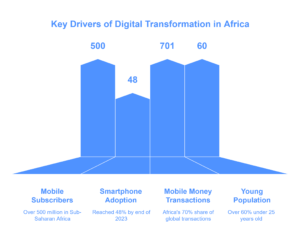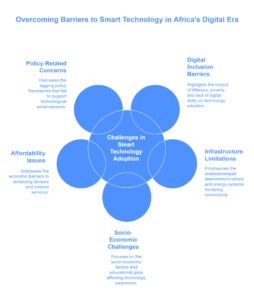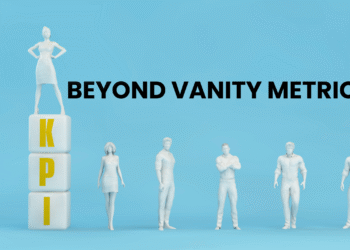In a small shop in Nairobi, a woman purchases groceries with a simple scan of her mobile phone. Two thousand kilometers away in Lagos, a farmer receives real-time updates on market prices and weather patterns through a basic smartphone. Meanwhile, in Cape Town, a family resolves their electricity billing dispute within minutes using an AI-powered chatbot—avoiding a day-long wait at a utility office.
The rapid integration of smart technologies is revolutionizing customer experience across Africa, driving innovation, economic growth, and unprecedented convenience. From AI-powered chatbots streamlining customer support to mobile money platforms reshaping financial access, businesses are leveraging technology to deliver faster, more personalised, and more efficient services. In a world where customer expectations are higher than ever, those who fail to embrace these advancements risk being left behind. How exactly is smart technology transforming customer interactions across key industries?
Africa’s digital economy is on track to grow from $180 billion in 2025 to a staggering $712 billion by 2050. companies that fail to integrate smart technologies risk being left behind. This article explores how businesses across various industries are leveraging technology to enhance service delivery, accessibility, and personalization, ultimately redefining the African customer experience.
Africa’s Unique Digital Transformation Journey
Unlike other regions, Africa’s digital transformation has not followed traditional models—it has leapfrogged them. Faced with infrastructural challenges, African innovators have built solutions tailored to local needs, creating a distinct and resilient digital economy.
Key Drivers of Smart Tech Adoption in Africa
- Mobile Penetration: Sub-Saharan Africa now has over 500 million mobile subscribers, with smartphone adoption reaching 48% by the end of 2023 (GSMA).
- Rise of Mobile Money: Africa accounted for nearly 70% of global mobile money transactions, with $701 billion in value in 2022 (GSMA).
- Young, Tech-Savvy Population: With over 60% of Africa’s population under 25, there is a growing consumer base eager to embrace digital solutions.

Now, let’s dive into how smart technologies are reshaping customer experience across key sectors.
1. Mobile Money: The Foundation of Africa’s Digital Economy
One of the biggest success stories in Africa’s digital transformation is mobile money. Platforms like M-PESA in Kenya, EcoCash in Zimbabwe, and MTN Mobile Money have revolutionized financial services, bringing banking to millions of unbanked individuals.
In March 2022, Safaricom announced that M-PESA had reached a major milestone: the service was being used by 51 million customers across Africa, with Kenya alone contributing more than 30 million of these active users. This statistic reflects M-PESA’s expansive reach across Kenya, Tanzania, the Democratic Republic of Congo, Mozambique, Lesotho, Ghana, and Egypt. By 2023, this growth solidified its status as one of Africa’s most impactful mobile money platforms.
How This Enhances Customer Experience
- Faster, More Secure Transactions – Customers enjoy seamless payments and instant transfers without the need for bank visits.
- Personalized Financial Services – AI-driven credit scoring enables tailored financial products for previously unbanked populations.
2. AI-Powered Customer Support: The New Standard for Service
Customer experience (CX) remains one of the greatest challenges facing businesses across Africa and the Middle East—especially as consumer expectations have never been higher. In NTT’s annual Global Customer Experience Benchmarking report, “The Connected Customer: Delivering an Effortless Experience,” Dimension Data revealed that only 6% of organizations are currently delivering a fully functioning customer experience, even though 63% view CX as their primary differentiator.
This gap is further highlighted by recent findings that 68% of African businesses lack structured customer feedback systems, making it even more difficult to meet evolving customer needs. In response, AI-powered chatbots and virtual assistants are stepping in to fill the void, providing around-the-clock support and personalized interactions that redefine customer service. These technologies are rapidly setting a new standard—transforming traditional support structures into agile, data-driven systems capable of delivering the seamless, effortless experience that today’s customers demand.
How This Enhances Customer Experience
- 24/7 Availability – AI chatbots provide real-time support, eliminating long call center wait times.
- Multilingual Capabilities – Businesses can now engage customers in multiple African languages.
- Predictive Problem Solving – Machine learning enables proactive service, reducing customer frustration.
3. E-Commerce & Last-Mile Delivery Innovations
last-mile delivery remains a challenge, particularly in rural areas. Companies are turning to AI-driven logistics and IoT solutions to enhance efficiency.
How This Enhances Customer Experience
- Faster, More Reliable Deliveries – AI optimizes routes to ensure timely deliveries.
- Personalized Shopping Experiences – Smart analytics enable tailored recommendations and promotions.
- Supply Chain Transparency – IoT tracking allows customers to monitor order progress in real time.
4. AI & Smart Agriculture: Boosting Productivity
With 60% of Africa’s workforce in agriculture, technology-driven solutions are transforming the industry.
How This Enhances Customer Experience
- More Informed Decisions – Farmers get real-time data on pricing, weather, and disease outbreaks.
- Increased Productivity – AI-driven solutions help optimize farming techniques.
- Greater Market Access – Digital platforms connect farmers with buyers across borders.
5. 5G & Smart Devices: The Future of Connectivity
Africa’s digital transformation relies on improved internet access. With 5G adoption rising, telecom giants like MTN South Africa are launching affordable 5G smartphones to bridge the digital divide.
How This Enhances Customer Experience
- Seamless Connectivity – Faster internet enables high-quality digital interactions.
- Omnichannel Engagement – Businesses can offer consistent experiences across mobile, web, and AI chatbots.
- Digital Inclusion – Smart devices bring services to underserved communities.
Challenges and Barriers
The integration of smart technologies in enhancing customer experience in Africa faces several significant challenges and barriers that hinder progress and adoption.
While smart technologies are driving progress, challenges remain:
Digital Inclusion Barriers
A critical issue affecting the adoption of smart technologies is the ongoing digital divide. Key barriers include high illiteracy rates, poverty limiting access to smartphones and assistive technologies, and a lack of digital skills among these populations
Infrastructure Limitations
Telecommunications infrastructure in Africa is often underdeveloped, with many regions lacking reliable internet connectivity and sufficient energy supplies to support smart technologies. This inadequacy results in poor service delivery from Internet Service Providers (ISPs) and limits the potential of e-commerce and other online platforms. The absence of secure and efficient infrastructure leads to economic challenges, as businesses struggle to operate effectively in an environment where reliable connectivity is not guaranteed
Socio-Economic Challenges
Socio-economic factors also play a significant role in hindering the adoption of smart technologies. High levels of unawareness about technology create a climate of risk aversion, slowing down the diffusion of e-commerce and smart solutions. Additionally, the educational landscape in many African nations does not adequately prepare individuals for the technological demands of the modern marketplace, limiting the potential workforce’s ability to effectively engage with digital tools and platforms
This lack of technological knowledge restricts individuals from appreciating the value of smart technologies, further impeding progress.
Affordability Issues
Affordability remains a substantial barrier, with the high costs associated with devices and internet services acting as a significant hindrance for low-income populations. This economic barrier restricts access and limits individuals’ ability to develop and enhance their digital skills. Without targeted policies to address these affordability issues, the potential for widespread adoption of smart technologies remains constrained.
Policy-Related Concerns
In many cases, policy frameworks in African nations have not kept pace with technological advancements, leading to a mismatch between regulatory environments and the needs of emerging technologies.
Comprehensive digital policies prioritizing infrastructure investment and skills development are essential for fostering an environment conducive to the growth of smart technologies. The disconnect between decision-makers and the realities faced by society poses challenges in creating effective policies that promote inclusivity and sustainability in technology adoption:

The Future of Smart Customer Experiences in Africa
Looking ahead, several trends are likely to shape the evolution of smart technologies and customer experience in Africa:
5G expansion: With 5G networks now operational in countries including South Africa, Nigeria, and Kenya, ultra-fast connectivity will enable more sophisticated customer experiences, particularly in video-based service and augmented reality shopping.
Blockchain for trust and transparency: Blockchain adoption is growing for supply chain verification and secure transactions, with analyst projections suggesting a 61% annual growth rate in African blockchain implementations through 2027.
Voice as the next interface frontier: With over 2,000 languages spoken across Africa, voice-based interfaces are poised to overcome literacy and language barriers, with voice search usage already growing at 42% annually.
Sustainable tech solutions: Solar-powered service kiosks and energy-efficient technologies are gaining traction, aligning with both infrastructure challenges and growing environmental consciousness.
A Distinctly African Innovation Path
What makes Africa’s smart technology revolution particularly remarkable is not just its pace but its distinctly African character. Rather than importing solutions wholesale from other markets, African businesses and innovators are creating customer experiences that address local challenges while leveraging global technological advances.
For global observers, Africa’s smart technology evolution offers valuable lessons in constraint-based innovation and customer-centricity. For Africans themselves, it represents not just improved service experiences but expanded economic opportunities and solutions to long-standing challenges.
As this technological revolution continues to unfold, one thing is certain: the future of customer experience in Africa will be smart, mobile, and uniquely African.
How MAA Can Help
At Marketing Analytics Africa (MAA), we help businesses leverage AI and data-driven strategies to optimize customer experience.
Want to leverage AI for customer engagement? We’ve got the tools.
Get in touch today and let’s transform your customer experience with smart technology!




